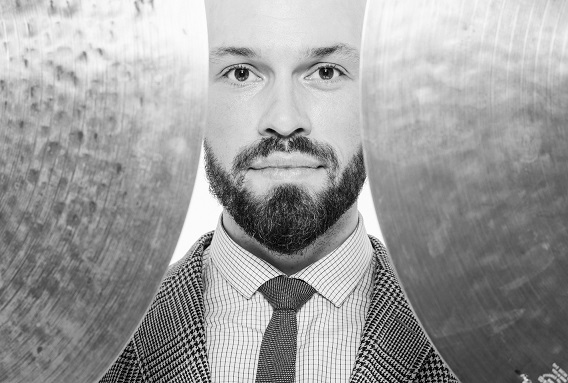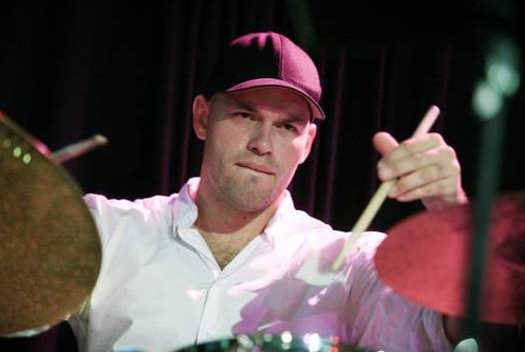Jazz interview with jazz drummer Snorre Kirk. An interview by email in writing.
JazzBluesNews.com: – First let’s start with where you grew up, and what got you interested in music?
Snorre Kirk: – I grew up in Norway, born in Oslo but later reloca8ng to Ålesund on the west coast. Both my parents are musicians, so I was always around music from the very beginning. Although classically trained musicians, my parents were always listening to a broad variety of music, so I was exposed to everything from baroque to bebop, tango to pop music, from a very early age, and I was always very interested in music as a kid, regardless of style.
JBN: – How did your sound evolve over time? What did you do to find and develop your sound?
SK: – I have always believed in working on geEng beFer first and foremost, and that eventually, a discernible personal sound will come out of that process. It’s a natural part of learning how to play, that you imitate and incorporate elements from others into your playing, but ul8mately, you will sound like yourself and the sum of your experiences, whether you like it or not. Changes in my sound an approach are usually the result of a listening process, working on understanding a given ar8sts or concept to its full extent.
JBN: – What practice routine or exercise have you developed to maintain and improve your current musical ability especially pertaining to rhythm?
SK: – Generally speaking, I always make sure to focus my prac8ce 8me on elements in my playing that I have a hard 8me playing or execu8ng. Certain things might take a week to master, others can take years, depending on the complexity of the issue at hand, and how much 8me it will take to develop. Regardless of what the exercise might be, I always try to put it in a musical context, and to make it swing, so it’s not an exercise for the sake of exercising only – the goal is always to keep it musical and relevant.
JBN: – How to prevent disparate influences from coloring what you’re doing?
SK: – I try to embrace them rather than to prevent them, and to me it’s a natural part of the process of learning how to play an instrument or learning to understand a style of music, regardless of idiom. Pablo Picasso claimed that he copied everyone except himself, and I have always subscribed to that idea – it worked out rather well for him, anyhow.
JBN: – How do you prepare before your performances to help you maintain both spiritual and musical stamina?
SK: – To me, the constant process of prac8cing, wri8ng and studying music keeps me musical shape, so to speak, and I try to stay in that headspace as much as possible, both on and off stage. Every day feels like a prepara8on of sorts, even when it is not for anything specific.
There could be talk or advertising about your CD
JBN: – Ism is culled from a variety of lives dates with various performers over the course of a few years. Did your sound evolve during that 8me? And how did you select the musicians who play on the album?
SK: – I’m not sure if this question is meant for me, or if I don’t fully understand the question?
JBN: – What’s the balance in music between intellect and soul?
SK: – To me, some music can be far too intellectual for my taste, but I have yet to run across anything I would consider being too soulful. I always try to stay cau8ous of the intellectual part.
JBN: – There’s a two-way relationship between audience and artist; you’re okay with giving the people what they want?
SK: – I don’t try to cater to a specific type of listener when composing – and musical tastes vary tremendously either way – but I am a strong believer in music being a social ac8vity, first and foremost, and I try to make music that brings people together, audiences and musicians alike.
JBN: – Please any memories from gigs, jams, open acts and studio sessions which you’d like to share with us?
SK: – There are too many for me to know where to even begin, but a recent memory that I think will stay with me for a while, was the making of our latest album, which was recorded on the same day that Denmark was shut down due to covid-19, forcing us to cancel the rest of the tour we were on at the 8me, as well as our subsequent recording dates, and barely managing to get Stephen Riley out of Denmark on the last plane leaving Copenhagen before all flights in and out of the country were grounded for weeks. It was an intense an memorable experience in every way.
JBN: – How can we get young people interested in jazz when most of the standard tunes are half a century old?
SK: – For one thing, I definitely believe in wri8ng new music. Playing on standards is great, and I love doing that too, but to me, there’s just something else about a band playing original music. Jazz is best experienced live, and I feel that the hardest part is oben to get younger people to come out to hear the music firsthand. If the music is good and makes them feel good, it’s irrelevant whether it is fiby years or old or wriFen last week.
JBN: – John Coltrane said that music was his spirit. How do you understand the spirit and the meaning of life?
SK: – To me, the process of a jazz band working out their differences and coming together as one, as a unit, in front of a live audience, can represent human interac8on and progress at its very best. The power of music to unite, touch and help people, regardless of creed, race, age or poli8cal inclina8on, is a very spiritual experience indeed.
JBN: – If you could change one thing in the musical world and it would become a reality, what would that be?
SK: – I would love to see a change in the gender balance within the performing jazz community – I believe we would all benefit from closing that demographic gap.
JBN: – Who do you find yourself listening to these days?
SK: – I’m always listening to music, new things and old things alike. Most recently, I have been studying the music of the great Benny Carter, as well as checking out a lot of la8n-american and caribbean music, classical works, gospel music, bluegrass – you name it.
JBN: – What is the message you choose to bring through your music?
SK: – That we’re all in this together, and that working things out requires effort, par8cipa8on and dedica8on from everyone involved, whether we’re talking swinging on stage or as member of society in general.
JBN: – Let’s take a trip with a time machine, so where and why would you really wanna go?
SK: – I would probably go to the 1950s, to be able to experience the musicians that have influenced me the most, in person, to hear what they sounded like in a room rather than on a record.
JBN: – I have been asking you so far, now may I have a question from yourself…
SK: – What do you find to be the most important element in jazz music?
JBN: – The swing!!!
JBN: – So puYng that all together, how are you able to harness that now?
SK: – I try to keep it going, and as of right now!
Interview by Simon Sargsyan







More Stories
Interview with Janis Siegel of The Manhattan Transfer: Jazz, being a more refined, interpreted form of music
CD review: George Benson – Dreams Do Come True: When George Benson Meets Robert Farnon – 2024: Video, CD cover
The band was tight as ever. The Warren Haynes Band cuts loose: Video, Photos